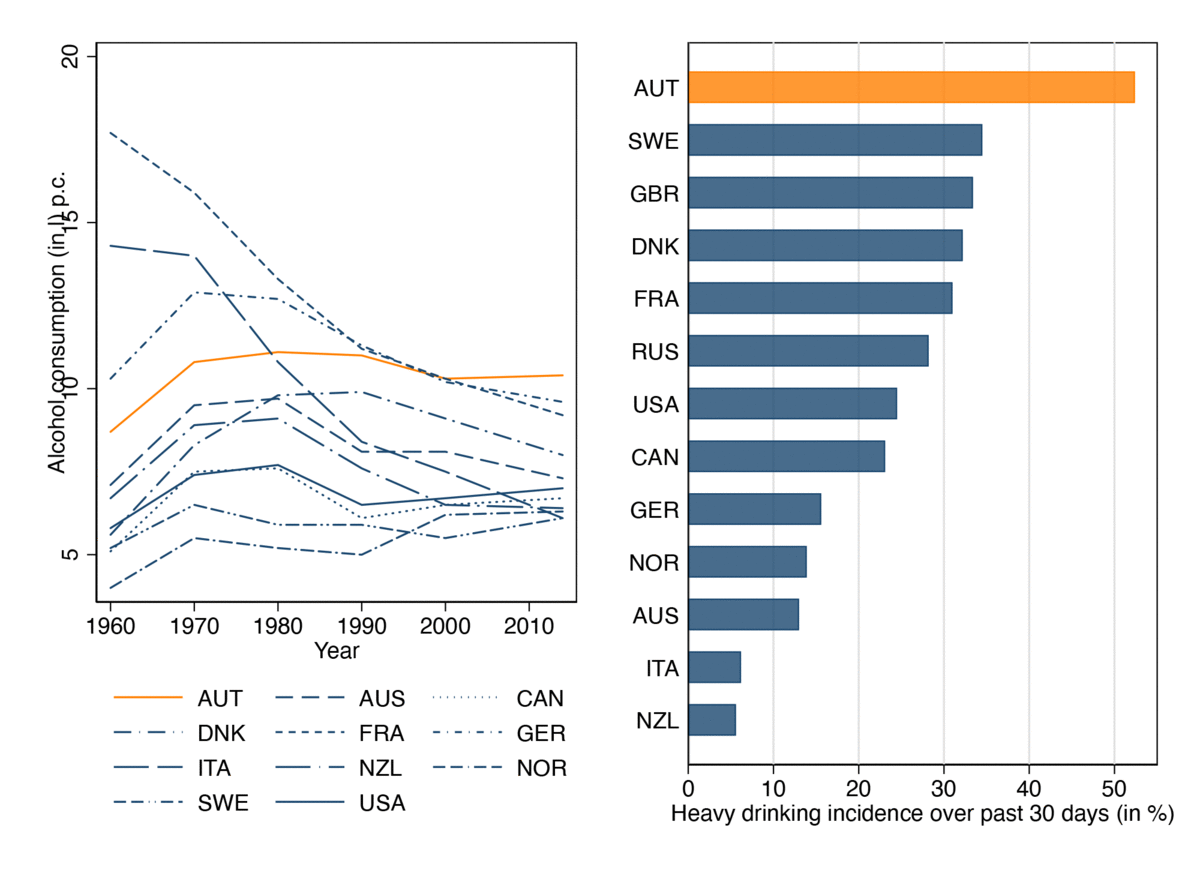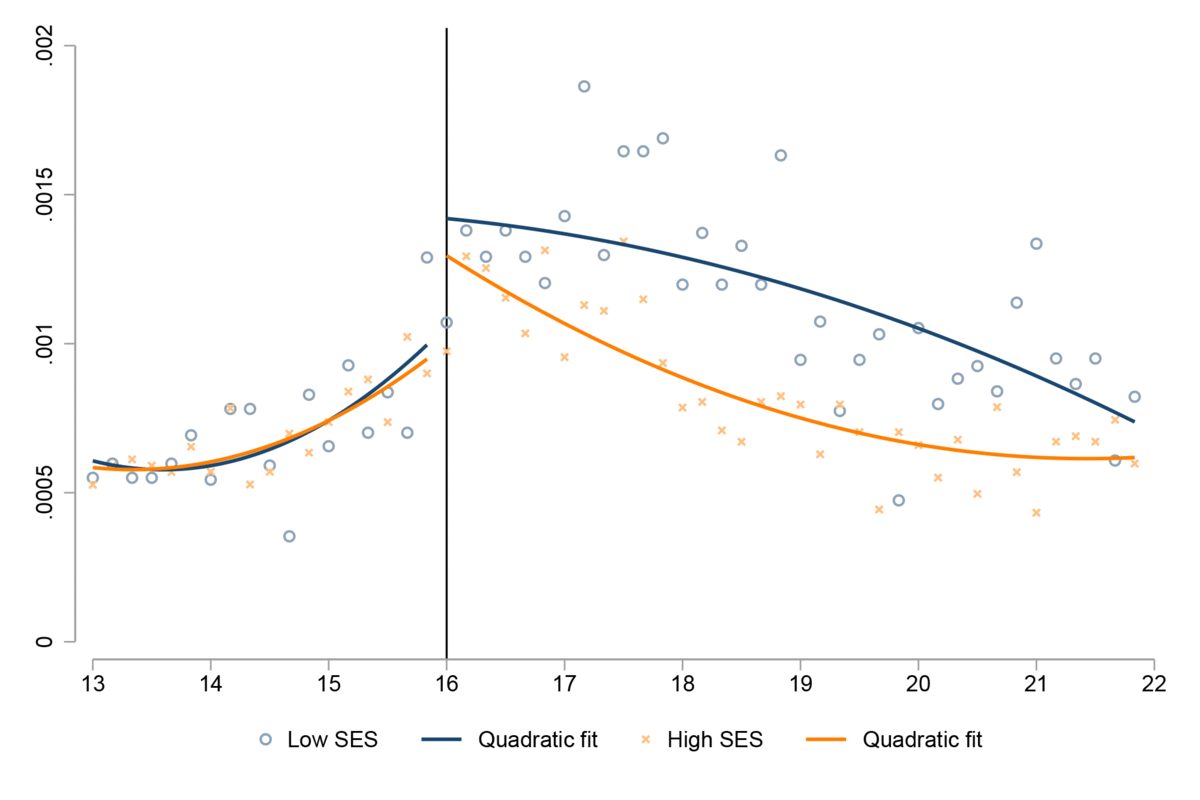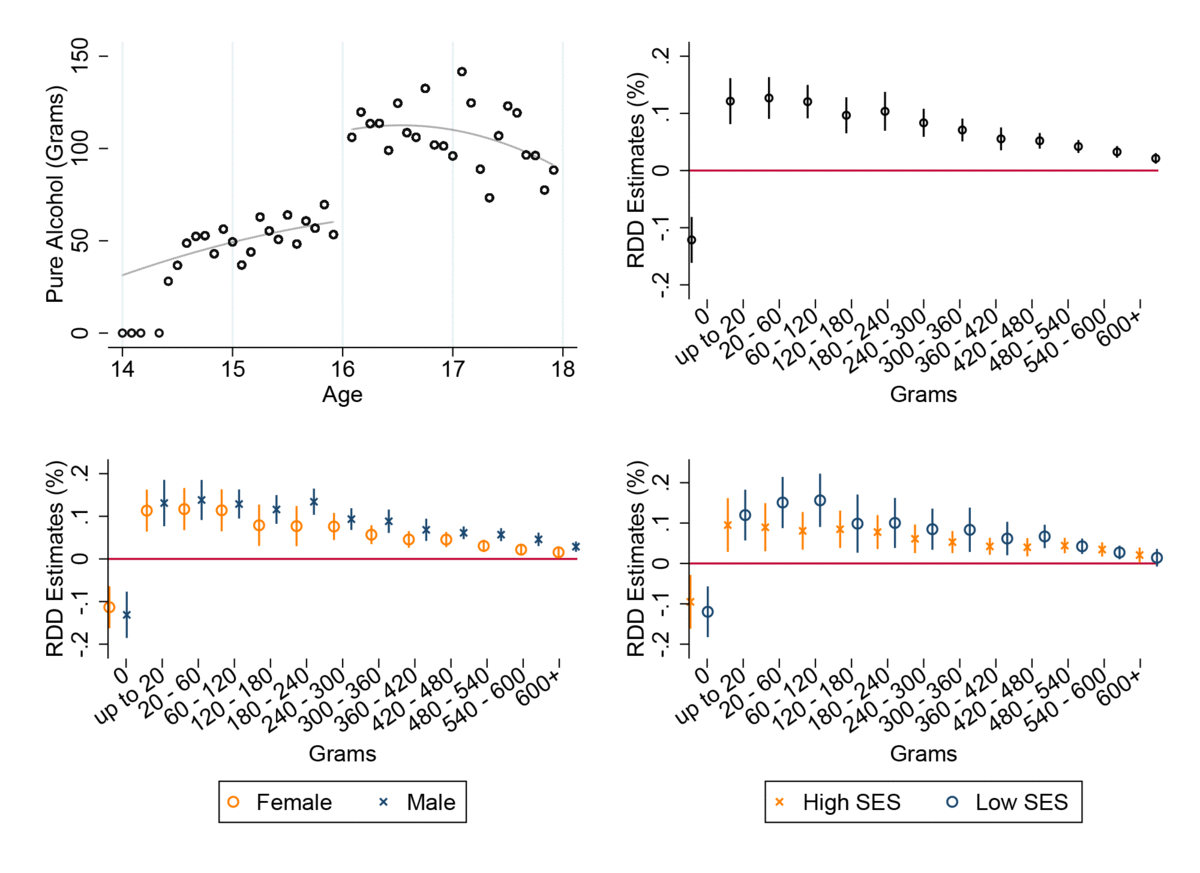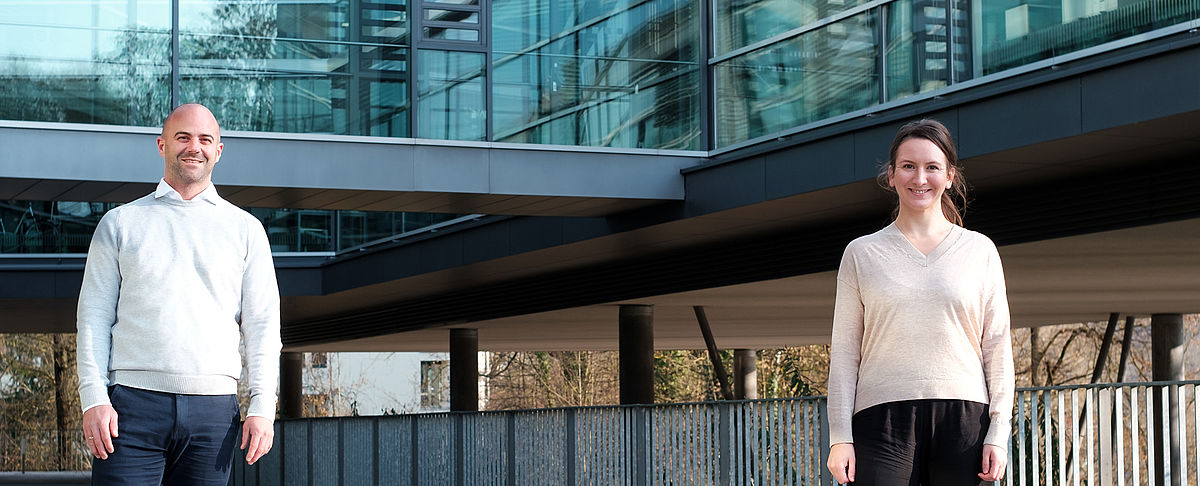When it comes to alcohol consumption, Europe is at the top of the list worldwide. Yet in spite of that, there has hardly been any research into the impact of the low minimum legal drinking age for alcohol consumption in European countries. There are studies on the subject, mainly from the USA, but these have little meaning for German-speaking countries, because in the USA the minimum legal drinking age for alcohol consumption is 21. In Belgium, Germany, Austria and Switzerland, by contrast, young people are already allowed to consume alcoholic beverages such as beer or wine from the age of 16. In our study "Minimum Legal Drinking Age and the Social Gradient in Binge Drinking", which appeared recently as a JKU working paper, we focus for the first time on the impact this low minimum age has on the drinking behaviour of young people in Austria.
Why alcohol?
Why is alcohol a thing that interests us economists? In 2016, 10.3 million people died from the consequences of alcohol consumption in EU+ (i.e. the EU countries plus Norway and Switzerland). More than 10 per cent of all the deaths in Europe are attributable to alcohol. So this is a relevant health problem that causes costs for society. Apart from the loss of healthy life years, research has also investigated the impacts of alcohol on productivity and education. It has, moreover, also been shown that alcohol not only harms those who drink it, but actually also has negative effects on third parties, for example because alcohol consumption also increases the crime rate and leads to an increase in the number of traffic accidents.
Why Austria?

Austria is interesting for several different reasons. For example because it stands out with its drinking behaviour in the 'heavy drinking index'.
In our study we focus on Austria, a country we find interesting for several reasons. For one thing, it stands out with its drinking behaviour in the 'heavy drinking index': in 2010, more than 50 per cent of all adult Austrians who were not complete abstainers said that in the past month they had drunk more than 0.5 litres of wine or three beers on at least one occasion. In the USA this proportion is only 25 per cent, and in Germany 16 per cent.
For another thing, we have a very good data situation here. Our study not only incorporates representative data from the European School Survey Project on Alcohol and other Drugs (ESPAD), in which more than 7000 pupils of the ninth and tenth grades at Austrian schools were polled in 2015 about their alcohol and drug consumption. We also have a register dataset from the Upper Austrian Health Insurance Fund (OÖGK), in which we were able to observe 91,208 young people aged 13 to 21 – i.e. both before they reached the minimum legal drinking age and after they reached it. We have information about every single case of hospitalisation among these young people, with the exact medical diagnosis. That means that we also know about it if any of them were admitted to hospital with alcohol poisoning. Last but not least, we also used data from a large-scale field study in which under-age test buyers attempted to purchase alcohol from shops in Upper Austria.
One of the first things we found interesting was whether or not it is easy for teenagers in Austria to obtain alcohol. It is: in approximately 25 per cent of cases, girls and boys aged 14 and 15 posing as test buyers succeeded in purchasing a bottle of vodka. That means that the statutory regulation is not applied very strictly in the shops; even strong alcohol is fairly easy to procure. More confirmation of this was to be found in the survey data, where as many as just under 85 per cent of the 15-year-olds said they found it easy to get hold of alcohol.
If that is so, we would not expect there to be a sharp increase in consumption at the age of 16. After all, alcohol is already available before that.
Sharp increase in alcohol consumption at 16
However, as soon as the 16th birthday has been reached, we make the following observations:
- The quantity of alcohol consumed by the young people in the past week increases dramatically by 90 per cent – from 55 grams of alcohol per week to 105 grams. That corresponds to approximately three pints of beer more on average. These effects are particularly strong for boys and for children from socially disadvantaged families.
- The probability of having drunk five alcoholic beverages or more on at least one occasions in the past month increases by 10 percentage points.
- The probability of being taken to hospital with alcohol poisoning increases by 42 per cent.

Comparison of young people from various different social strata: as from their 16th birthday, the probabilities of being taken to hospital with alcohol poisoning deviate clearly.
It is above all young people from socially disadvantaged families who drink more as soon as they have reached the minimum legal drinking age. Whilst the probability of alcohol poisoning prior to their 16th birthday is still very similar for young people from different social strata, a distinct gap opens up after their 16th birthday: from their 16th to their 21st birthday, the probability of their being taken to hospital with alcohol poisoning is substantially greater throughout in young people from socially disadvantaged families.
This is obviously a case of: if the legislators allow it, it can't be such a big issue. And that corresponds to the poll results: as from age 16, young people suddenly begin to assess regular binge drinking at weekends as a thing that is no longer as dangerous as it was before. Overdoing it slightly, one might perhaps describe the impact of this low minimum legal drinking age as a government licence to indulge in binge drinking.
Finally, we also looked into the question of what the situation is for young people who come from families in which there is evidence of harmful alcohol abuse by the parents. We assume that this is the case where there is a diagnosis of cirrhosis of the liver caused by alcohol. In this group we do not observe a sharp increase when the young people reach the minimum legal drinking age. But that does not mean that they don't drink – on the contrary: young people in this high-risk group often already drink to excess before they reach the statutory minimum age. For young people from socially disadvantaged families in which alcohol has already caused problems, even before their 16th birthday the probability of their being taken to hospital with alcohol poisoning is more than twice as great as it is in families in which there have not been problems caused by alcohol. So it seems that these young people copy the behaviour of their parents – and that they do so regardless of the requirements imposed by the legislators.
We economists are not concerned here with assessing drinking behaviour per se as either good or bad. Freedom and self-determination as regards one's own body are important values in our society, and rightly so.
Professor Stefan Bauernschuster, Hannah Lachenmaier (both from the University of Passau), Professor Martin Halla, Professor Alexander Ahammer (both from the Johannes Kepler Universität [JKU] in Linz)
So what are our conclusions? We economists are not concerned with assessing drinking behaviour per se as good or bad. Freedom and self-determination regarding one's own body are important values in our society, and rightly so. Indeed, the consumption of alcohol can certainly also be beneficial – for example as an aid to relaxation or in the form of the pleasure we might take in a social get-together. But it also entails costs. From a socio-political point of view, the effect on young people from socially disadvantaged families in particular could be a cause for concern. A higher minimum age might deter this group from indulging in binge drinking at the weekend. From a worldwide point of view, but also from a European one, a minimum age of 16 for the consumption of alcohol is very low. It follows that a comparison with the USA, where the minimum age is 21, reveals considerable differences in the drinking behaviour of young people.
Instead of raising the minimum age for everybody, the politicians could consider introducing special measures that are tailored quite specifically to young people from socially disadvantaged families and aim at handling alcohol in a conscientious way. Measures of this kind might then also reach those especially vulnerable young people who grow up in families in which alcohol has already caused problems. The fact is that, as we have shown, they constitute a high-risk group for whom nothing would change if the statutory minimum age were simply raised.
Update 12/7/2021: The study "Minimum Legal Drinking Age and the Social Gradient in Binge Drinking" has been published in the Journal of Health Economics, the leading journal in this respective field of research. To the original study
About the authors
Professor Stefan Bauernschuster
How do political measures influence decisions made by individuals and families?
How do political measures influence decisions made by individuals and families?
Professor Stefan Bauernschuster has held the Chair of Public Economics of the University of Passau since 2013. Moreover, he is a research professor at the ifo Institute in Munich, CESifo Affiliate and a member of the Social Policy Committee of the German Economic Association. He is also one of the principal investigators of the DFG Research Training Group 2720.
Hannah Lachenmaier studied International Economics and Business and is doing her doctorate at the University of Passau at the chair of Professor Bauernschuster. The study is the first part of her cumulative dissertation. It was she who had the idea for it: in her master's thesis, in which she focused on alcohol consumption and crime, she noticed that there were hardly any studies from Europe on this topic.
Professor Martin Halla is head of the Department of Economics at the Johannes Kepler University in Linz. He is a Research Fellow in the IZA Network and scientific adviser to the health instituteGesundheit Österreich GmbH.
Professor Alexander Ahammer is Assistant Professor (tenure track) in Applied Econometrics and Big Data at the Department of Economics at the Johannes Kepler University in Linz.
In the media
- Why alcohol is so dangerous for young adults' brains - Bericht von BBC Future (1.3.2024)









